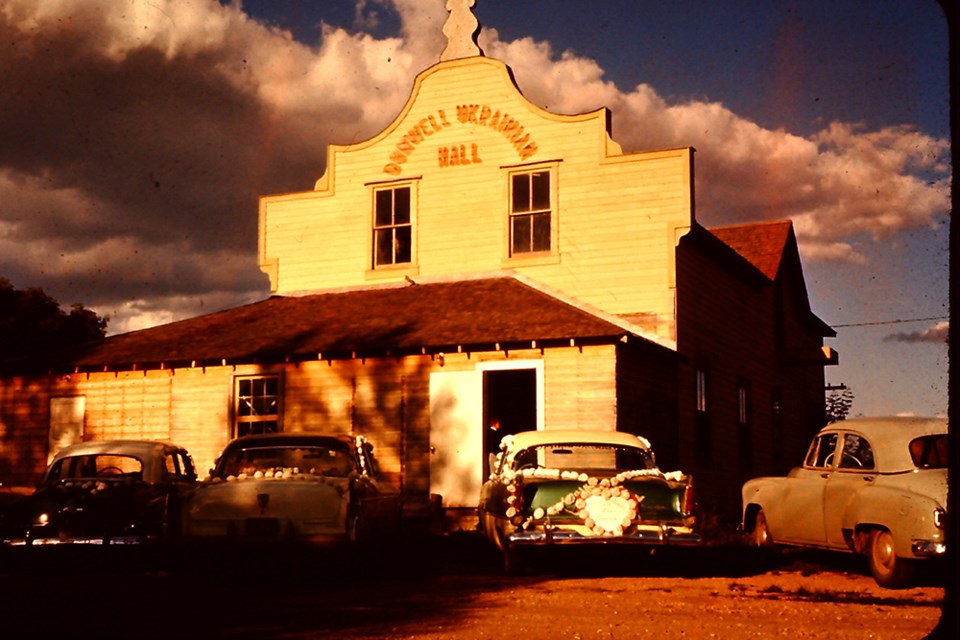A century of memories
DONWELL - Nestled among rolling fields and prairie winds, stands a weathered gem – a testament to community spirit and cultural heritage. The Donwell Community Hall, with its timeworn facade and echoes of laughter from generations past, has long been a cherished gathering place for the Ukrainian community. But time has taken its toll, and this historic building likely won’t remain standing for much longer.
The Ukrainian heritage of Donwell
Donwell is a small hamlet located five kilometres east and 10 kilometres south of Canora. The Donwell area was first settled by pioneer settlers, starting in 1897, from the areas of Galicia and Bukovina, which are in what is now Western Ukraine. At that same time, there were also several pioneer families that were of Ukrainian Lemko origin but had worked in Pennsylvania for several years before coming to homestead in the Donwell area.
The Russell Branch of the Canadian National Railway was constructed in 1911 and the Donwell station on the rail line was built in the fall of 1912 on a 40-acre parcel of land that was purchased by CN for the development of a town site. The CN station was quickly followed by a lumberyard, store, post office and from that start, the community of Donwell grew.
Prosvita Society reading room promoted Ukrainian culture
One of the early buildings established in Donwell by Omelyan Ochitwa was a store, which shortly after being built, also became the Donwell Post Office. This created a gathering place for the people in the area. Here in this store in 1914, a group of younger people formed the Donwell Prosvita Society Reading Room, in honour of Taras Shevchenko. This society became the heart of Ukrainian culture and learning not only to the nearby farmers and their children but to other Ukrainian community leaders and teachers, some of which came on bicycles from 30 miles away to participate in the cultural learnings and discussions.
Several of these participants later took on leadership positions and gained distinguished roles in Canada. From the time the Prosvita Society was formed, a festive picnic was held each year which then evolved to a Sports Day, which went into the late 1950s when the Donwell Supers baseball team moved to Canora to become the Canora Supers baseball team.
First Ukrainian National Home in Saskatchewan
The Prosvita Reading Society initiative quickly recognized the need for a larger facility to foster cultural Ukrainian events in the community and surrounding areas. In the summer of 1917, the first Ukrainian National Home (Ukrainian Narodny Dim) in Saskatchewan was built in Donwell. Aksenty Rollack, an experienced church builder who had migrated from Galicia in 1899, served as the lead foreman on this project. The $70 to purchase the land was donated by Omelyan Cymbalisty, Oleksandr Warcholick and Ivan Chocholik.
To finance the construction, the building committee secured a $400 bank loan, and additional donations came in from the broader community. The initial governing board of the Narodyn Dim included Kostya Sklaruk (Chairman), Anton Remenda (Vice Chair), Omelyan Ochitwa (Secretary), Dmytro Cymbalisty (Treasurer), Volodymyr Kereluke and Vasyl Kuruliak (Controllers), and Dmytro Mamona and Dmytro Shvets (Librarians). Over the years, the Hall underwent expansions, including the addition of a front porch, a kitchen – dining extension to the north, and an extension to the south, providing extra space for community activities.
A centre for community
The Donwell Ukrainian National Home quickly evolved into a vibrant hub for community gatherings, cultural events, and social activities. It hosted readings, singing sessions, lectures, plays, concerts, as well as joyous occasions like weddings, anniversaries and dances. Although officially named Ukrainian National Home of the Taras H. Shevchenko Society, it was affectionately known to all as the Donwell Hall.
Presidents of the Ukrainian National Home from 1914 to 1981 were: Dmytro Cymbalisty, Kost Sklaruk, Mikhailo Gabora, Mikhailo Korol, Wasyl Iliuk, Stephan Kopelchuk, Mikhailo Kowalyshyn, Oleksa Lenko, Ivan Elash, Petro Kopelchuk, Petro Procyshen, Joseph Mazur, Emil Makowsky and Dymtro Sklaruk.
In 1935, the Women’s Association was established in honour of Olha Kobylamska, at the Donwell Narodny Dim. That same year, these ladies joined the Ukrainian Women’s Association of Canada, which provided financial assistance for the purchase of chairs and other furnishings for the Hall.
Although the Women’s Association was never very large, the group remained highly active in the community. Notable leaders of the Women’s Association included: Stefania Chocholik, Oleksandra Rosnowsky, Marusya Sklaruk, Lillian Petriw and Halya Cymbalisty.
Current long-time residents of Canora and area probably best remember the Donwell Hall for its Friday night dances of the 1950s and 1960s. Cars would converge from nearby areas, drawn by the lively entertainment provided by a variety of bands and orchestras. For many singles, the Donwell Hall became a place where they met or took their future spouses dancing. The evenings were not only filled with good music and dancing, but also featured a midnight lunch and coffee courtesy of the Women’s Association, ensuring that the dancers could keep going for an hour or two longer.
End of an era
As in the case with most rural communities in Saskatchewan, the younger local population moved to larger urban centers. The Donwell Hall organizations disbanded, and events at the Hall ceased altogether. As the building has weathered the years, structural problems created by the rain, snow and ice have taken their toll.
The future of the Donwell Hall remains uncertain. Nevertheless, it stands as a genuine tribute to the dedicated pioneers who constructed and maintained it over the decades. For those of us fortunate enough to have experienced the Donwell Hall, it holds cherished memories. Indeed, it proudly represents Saskatchewan’s First Ukrainian National Home.
Don't count on social media to deliver your local news to you. Keep your news a touch away by bookmarking Canora Courier's homepage at this link.
Bookmark SASKTODAY.ca, Saskatchewan's home page, at this link.




